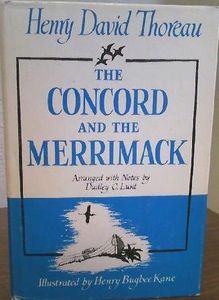A Week on the Concord and Merrimack Rivers is ostensibly the narrative of a boat trip from Concord, Massachusetts to Concord, New Hampshire, and back, that Thoreau took with his brother John in 1839. John died of tetanus in 1842 and Thoreau wrote the book, in part, as a tribute to his memory. While the book may appear to be a travel journal, broken up into chapters for each day, this is deceptive. The actual trip took two weeks and while given passages are a literal description of the journey — down the Concord River to the Middlesex Canal, to the Merrimack River, and back — much of the text is in the form of digressions by the Harvard-educated author on diverse topics such as religion, poetry, and history. Thoreau relates these topics to his own life experiences, often in the context of the rapid changes taking place in his native New England during the Industrial Revolution, changes that Thoreau often laments.
